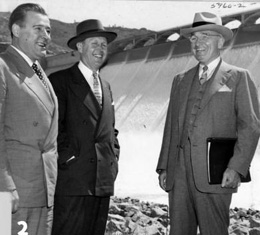On May 11, 1950, President Harry S. Truman (1884-1972) makes an appearance before 3,000 to 4,000 spectators at Gonzaga University in Spokane to receive a Citation of Merit and to make a policy speech centering on racial equality. He advocates legislation that will reduce discrimination and ensure "that every citizen can participate equally in our national life."
The school's Jesuit leaders had come to admire Truman's views on the religious roots of American law and government and they originally proposed giving him an honorary degree. However, he told Gonzaga that he was reluctant to accept an honorary degree from any but his own alma mater, but he would accept a Citation of Merit.
Truman was already planning a trip to Washington to dedicate the Grand Coulee Dam. So after the dam dedication early on May 11, he arrived the same day in Spokane and was greeted by the gathered crowd on the school's quadrangle. The crowd gave him a 17-second ovation as he was introduced.
His speech, which became known as "the Gonzaga Speech," was widely considered to be both a challenge and an olive branch to the Dixiecrats -- Southern Democrats -- with whom he had clashed on racial equality issues. He said, "We believe that no person -- and no group of people -- has an inherent right to rule over any other person or any other group." Yet he also said that he believed "we can advance the common welfare without harming the dissenting minority."
Father Francis Corkery, the university's president, then presented Truman with his citation "for repeatedly proclaiming that the law of nations is derived from the law of God."

